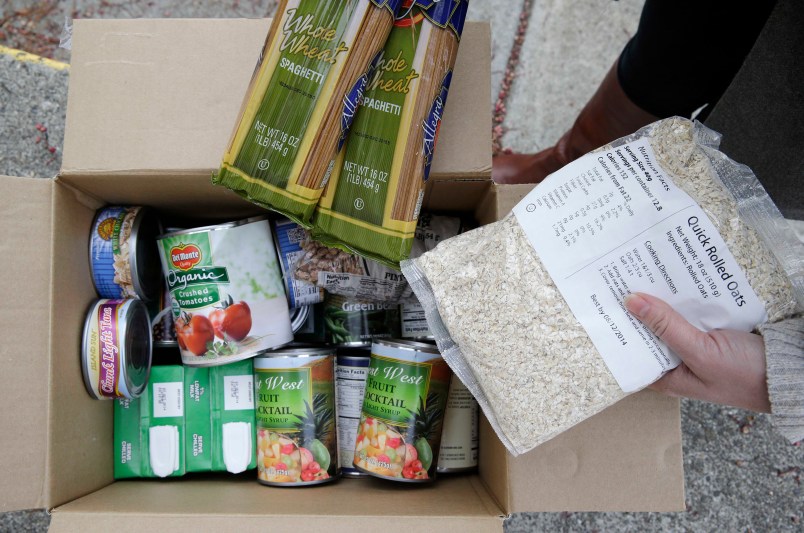WASHINGTON (AP) — House Republicans are laying the groundwork for a fresh effort to overhaul the nation’s food stamp program during Donald Trump’s presidency, with the possibility of new work and eligibility requirements for millions of Americans.
The GOP majority of the House Agriculture Committee is releasing its two-year review on Wednesday. It stops short of making specific policy recommendations, but it does hint at areas that congressional Republicans could focus on with their GOP monopoly under Trump: strengthening current work requirements and perhaps creating new ones, tightening some eligibility requirements or creating new incentives to encourage food stamp recipients to buy healthier foods.
“There’s nothing off the table when it comes to looking at solutions around these areas where we think improvements need to be made,” House Agriculture Chairman Mike Conaway, R-Texas, said in an interview with The Associated Press.
The food stamp program, called the Supplemental Nutrition Assistance Program, or SNAP, now serves about 43.6 million people and cost $74 billion in 2015. Participation in the program rose sharply as the country suffered a recession, and the program now costs roughly twice what it did in 2008.
The report is based on 16 House Agriculture Committee hearings and lays out several findings, including that better enforcement of some SNAP work programs is needed in some states and that 42 states use broad eligibility standards that some Republicans have criticized as too loose. It also encourages more incentives to get people to buy healthy food with their food stamp dollars, addressing criticism that recipients use taxpayer money to buy junk foods. The report cites USDA data showing that 10 percent of foods typically purchased by SNAP households are sweetened beverages.
It’s unclear how or when an overhaul could happen. Food stamp policy is included in a wide-ranging farm bill every five years; the next one is due in 2018. It could also be part of a larger effort headed by House Speaker Paul Ryan, R-Wis., to tackle welfare or entitlement reform, if that should happen in the next Congress.
Still, food stamp reform has always been a hard sell in Congress. Democrats almost unilaterally oppose any changes, and some Republicans from poorer districts are also wary. The 1996 welfare law added some new work requirements, but Congress declined to convert federal food stamp dollars into block grants for the states, a move that would cut spending for the program.
In 2013, House Republican leaders tried to cut the program by 5 percent annually by passing broad new work requirements as part of the last farm bill. The House bill also included drug testing for recipients.
The then-Democratic Senate balked, though, and the final bill included a much smaller cut and no allowances for drug testing.
Conaway said he’s open to any of those policies, but suggested that block granting the program — a past priority for Ryan — or drug testing recipients are not his priorities.
“We don’t want to be helping folks on drugs, but then again, folks on drugs have children,” Conaway said.
On block granting, Conaway said it’s not off the table, but not a top priority.
“We want to be more focused on getting people off the program and into successful lives and on their own two feet as opposed to being focused on how many people are there, how much money we’re spending,” he said.
He said the report should help lawmakers be “not as knee-jerk reactionary as they have been in the past.” The 2013 effort didn’t resonate well, he has said, because Republicans didn’t spell out why it was necessary.
Part of the calculation will be what Ryan proposes. He strongly supported block granting food stamps as part of his larger plans for welfare reform when he was chairman of the House Budget Committee. But an agenda he released earlier this year after becoming speaker was vaguer, only suggesting that some food aid programs could be consolidated.
As for Trump, he’s said little about what he’d want to do with the program. But he has frequently mentioned how the rolls have increased since President Barack Obama took office.
Kansas Sen. Pat Roberts, the Republican chairman of the Senate Agriculture Committee, was heavily involved in the 1996 welfare reform. He has said his committee will review the food stamp program, but hasn’t made any specific proposals.
He says block grants would face significant opposition in the Senate, and he’s not sure whether new work requirements would pass muster, either.
“To be determined,” he said.
Copyright 2016 The Associated Press. All rights reserved. This material may not be published, broadcast, rewritten or redistributed.







So they want more work requirements when there is no work, they want healthy choice made when spending SNAP dollars but derided Michelle O when she wanted to increase healthy food choices in schools, they want to drug test recipients but it has been shown they spend way more dollars on drug testing than they saved. And yet with all this cutting of Food Stamps have they cut any farm subsides?
I can’t wait until the “white working class” figures out they mean them too… (of which there are far more recipients… and heroin addicts…)
Yeah! Cause everybody knows that people who are strung out on drugs can quit any time they want without the help from anybody.
By the way Conaway, are you aware that the vast majority of people on food stamps have little to no money at all to buy drugs, alcohol or even cigarettes? Thus the reason why they are on food stamps in the first place.
Conaway, you win the big “DUH!” of the day award.
When that happens, they are going to make the Native Americans passive resistance at Standing Rock look like a picnic. DC will be under constant siege.
Indian Summer is coming soon!